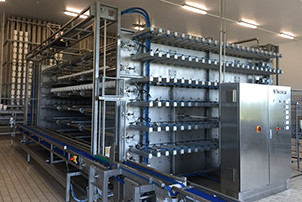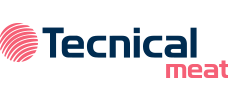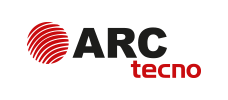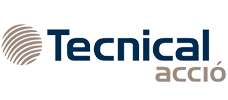OPTIMIZATION
In a cheese production plant, the surface area is usually a scarce resource, whether due to the financial investment involved in purchasing it or the difficulty of building an extension. For this reason, at Tecnical we aim to optimize the space to the full. The objective is to take up as little surface area as possible, exploiting to the full the volume of the rooms: the moulding machines and pressing systems, the washing systems, the mould accumulators and salters are designed with this aspect in mind.
MAKING THE MOST OF THE PRODUCTION BUILDINGS HEIGHT
Traditionally, cheese making equipment, mainly the pre-press systems of the strainer type, presses, mould accumulators and salters, take up a lot of surface area while providing very little volume. Tecnical has opted to innovate the design of these processes in such a way that the height of the facility is exploited to the full for cheese production, thus maximizing the return on each available square metre.
MOULDING SYSTEMS: SPACE AND PRODUCTION OPTIMIZATION
The vertical moulding and pre-pressing system with the TPI MULTI-FORMAT MOULDING makes it possible to process cheeses in numerous shapes and sizes in a small space and using a single machine, with mechanical eyes or blind. This automatic moulding system makes it possible to increase the production output, minimizing the fines generated and succeeding in unifying the various different moulded cheeses. With this system, production is optimized, the surface area used and cheese yield.
PRESSING SYSTEMS: ULTRA-HIGH AUTOMATIC HORIZONTAL PRESSES
Tecnical has patented a new pressing system based on the horizontal press concept, as we believe that they give a better result, and we have automated the loading/unloading system so that the press can have as many levels at the production plant building will accommodate. A modified press can be installed in a small space to work with a wide range of shapes and sizes, which makes it possible to control and adjust the pressures and pressing durations. In this way, production and the space required to install the machine are further optimized.
THE MANY BENEFITS OF AUTOMATIC STORAGE OF MOULDS AND COVERS
Vertical mould and cover accumulation systems can significantly simplify storage, reducing the labour required and the space occupied. Automating this process means that the useful life of the moulds can be prolonged by avoiding the impacts that can occur when inserting or extracting them manually from the line when changing the size or shape format.
TECHNOLOGICAL IMPROVEMENTS TO SALTING SYSTEMS
Immersion cheese salting systems are a major improvement in terms of space-saving in cheese production plants as more surface area can be used to store a very large quantity of cheeses. In recent years, several different immersion salting systems have been developed to suit different types of cheese, different shapes and sizes and production requirements, laying special emphasis on traceability, salting homogeneity and flexibility of production, while at the same time taking account of the importance of optimizing space.





